 Financial therapy in action
Financial therapy in action
By Mikelann Valterra, MA, AFC©
“Can I afford to take two weeks in Hawaii?” … “Should I do the facial package?” … “I really want a new couch!”
Spending decisions are all around us. “Should I really buy this”? “Can I afford this?” “Should I do this?”
I often tell my clients,
“You can do anything you want, but you can’t do everything you want”.
So how do you know what you truly want? In the coming weeks, I’ll share a series of questions I pose to clients to help them make better spending decisions. These questions tap into our intuition and other parts of ourselves, so we make a decision we feel great about.
Benefits of good spending decisions:
- Avoid feeling guilty over purchases.
- Discern faster if you should buy something.
- Process a potential big purchase on multiple levels to ensure satisfaction.
Welcome to an important aspect of financial therapy.
Today’s spending decision question is: Will this purchase give me short term or long-term satisfaction? Said another way, will it give me a fleeting feeling of pleasure or long-term happiness? Is this just about feeling good right now?
One way to discern this is to ask yourself: when did this desire arise? If it is very recent, it is likely a short-term satisfaction hit. If it’s been on your mind for a while, it may be about long-term satisfaction. I didn’t want the 18k gold earrings at Macy’s until I saw them. But once I saw them, I wanted them! Short term satisfaction!?
Another way to get at this is to say,
“How will I feel about this purchase a month from now, if I spend the money?”
There is nothing wrong with short-term satisfaction. But naming it puts you in a powerful place. If it is short term satisfaction, you may want to spend less. You don’t need to invest as much if it is clearly short term.
While I decided I’d still like the earrings a month from now, I didn’t need to invest in the expensive 18k gold pair. I bought a gold-plated pair that was on sale.
What also helped me decide was another trick—I walked away for an hour. I went to buy something that was on my list, while I mulled over my desire for the earrings. Whenever caught in the “I gotta have it!” simply walk away for an hour. If you still deeply desire it when you come back, it may be connected to long term satisfaction. Regardless, you will make a more reasonable decision when you come back to whatever caught your eye.
Short term satisfaction is often experienced when you are “in the moment” shopping- whether online or in person. Something catches your eye, like jewelry. If a purchase is pre-planned, it is likely more connected to longer-term satisfaction.
This is one reason why shopping with a list is helpful and satisfying. When we purchase from a list we made, we feel less money guilt and more thoughtful. We’ve also had time to look forward to the purchase, making the pre-planned purchase even more enjoyable.
When you pose the powerful question, “Will this purchase give me short term or long-term satisfaction”? it also immediately calls you to your values.
When spending aligns with one of your core values, it is more likely to give you long-term satisfaction.
If you value the outdoors and hiking, hiking gear will give you greater satisfaction than expensive party clothes you spy while shopping. I value dancing and rarely hike, so for me, good tango shoes will give me greater long term satisfaction than the cute hiking shorts or boots I discover while shopping.
If you value home, a good quality couch purchase can feel great and give you long term satisfaction. If you are rarely home, an expensive couch may simply have caught your eye and be about short-term satisfaction.
It always pays to be aware of what you value, when it comes to spending money. If a purchase is connected to one of your values, it is more likely to give you long-term satisfaction.
Remember, this is not about forgoing or depriving yourself by always saying no. It’s about being truly satisfied over the long haul. It’s about feeling good with how you spend your money and buying things that really do give you long term satisfaction.
 Take me on a walk this month by listening to this podcast about your midlife money mindset! Host Kim starts by asking me about what takes courage, and I share about dancing in the upcoming national Tango competition. Yikes. From there we look at how to think about your childhood money story and how this affects your money mindset. We dive into overcoming underearning, guilt-free spending, stepping into true prosperity, and being financially stress free. One key: dispel the ‘money fog.’ Yes, you really can get rid of the stress and anxiety caused by financial vagueness and create a life you LOVE. Dive into financial psychology with me. Enjoy!
Take me on a walk this month by listening to this podcast about your midlife money mindset! Host Kim starts by asking me about what takes courage, and I share about dancing in the upcoming national Tango competition. Yikes. From there we look at how to think about your childhood money story and how this affects your money mindset. We dive into overcoming underearning, guilt-free spending, stepping into true prosperity, and being financially stress free. One key: dispel the ‘money fog.’ Yes, you really can get rid of the stress and anxiety caused by financial vagueness and create a life you LOVE. Dive into financial psychology with me. Enjoy!
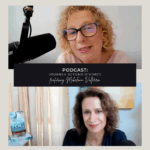
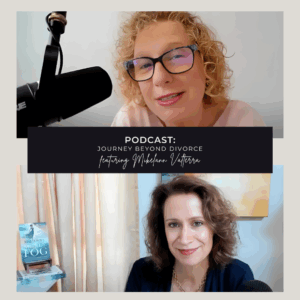 In this podcast, I join Karen McMahon for her show, Journey Beyond Divorce. Karen is a high conflict divorce coach and strategist, and we explore the concept of how your “money personality” affects relationships. Divorce often uncovers hidden money patterns that impact both your relationship and divorce negotiations. So, in this episode, we explore how your money personality—whether you’re a spender or a saver—shapes your marriage and divorce. We dive into the deeper financial motivations that may be influencing your decisions and offer strategies to break free from limiting beliefs around money.
In this podcast, I join Karen McMahon for her show, Journey Beyond Divorce. Karen is a high conflict divorce coach and strategist, and we explore the concept of how your “money personality” affects relationships. Divorce often uncovers hidden money patterns that impact both your relationship and divorce negotiations. So, in this episode, we explore how your money personality—whether you’re a spender or a saver—shapes your marriage and divorce. We dive into the deeper financial motivations that may be influencing your decisions and offer strategies to break free from limiting beliefs around money.
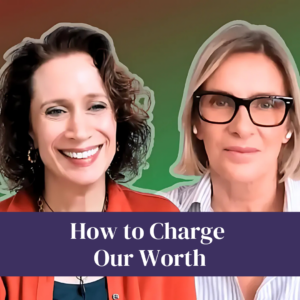 Want to feel better about charging money?
Want to feel better about charging money?
 By Mikelann Valterra, MA. AFC®
By Mikelann Valterra, MA. AFC®
 Financial therapy in action
Financial therapy in action
 From money fog to tango, this is a fun podcast episode. I guested on Bernie Borges Midlife Fulfilled Podcast, that is for those over 40 who are ready to thrive. We talked about the connection between money and happiness, how to simplify your finances, and yes, tango. Part of working with money is getting clear on what is important to you and protecting it.
From money fog to tango, this is a fun podcast episode. I guested on Bernie Borges Midlife Fulfilled Podcast, that is for those over 40 who are ready to thrive. We talked about the connection between money and happiness, how to simplify your finances, and yes, tango. Part of working with money is getting clear on what is important to you and protecting it.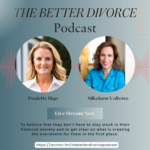
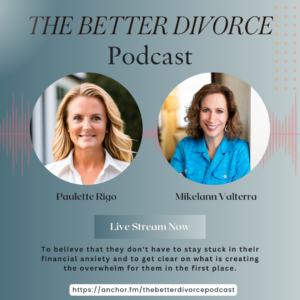 In this conversation, Paulette Rigo of the Better Divorce Podcast, and I delve into the intricate relationship between divorce and finances. Does financial anxiety disproportionately affect women? Yes! We talk about the emotional aspects of money management, and the importance of understanding one’s money story. I also talk about the differences in how men and women approach financial anxiety and the significance of addressing these feelings to regain control over one’s financial future. AND we explore the historical shifts in women’s financial empowerment, with stories from our own families. From me, to mom, to my grandmother. Whew! Intense! So, listen in for a fascinating discussion of women, divorce and our relationship to money. You really can have a “better divorce”.
In this conversation, Paulette Rigo of the Better Divorce Podcast, and I delve into the intricate relationship between divorce and finances. Does financial anxiety disproportionately affect women? Yes! We talk about the emotional aspects of money management, and the importance of understanding one’s money story. I also talk about the differences in how men and women approach financial anxiety and the significance of addressing these feelings to regain control over one’s financial future. AND we explore the historical shifts in women’s financial empowerment, with stories from our own families. From me, to mom, to my grandmother. Whew! Intense! So, listen in for a fascinating discussion of women, divorce and our relationship to money. You really can have a “better divorce”.


 Listen in on a great conversation I had with Susie Pettit from the
Listen in on a great conversation I had with Susie Pettit from the 
 By Mikelann Valterra, MA, AFC
By Mikelann Valterra, MA, AFC